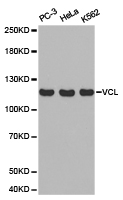Vinculin (VCL) Rabbit Polyclonal Antibody
Frequently bought together (3)
beta Actin Mouse Monoclonal Antibody, Clone OTI1, Loading Control
USD 200.00
Other products for "Vinculin"
Specifications
| Product Data | |
| Applications | WB |
| Recommended Dilution | WB 1:500 - 1:2000 |
| Reactivities | Human, Mouse, Rat |
| Host | Rabbit |
| Isotype | IgG |
| Clonality | Polyclonal |
| Immunogen | Recombinant protein of human VCL |
| Formulation | Store at -20C or -80C. Avoid freeze / thaw cycles. Buffer: PBS with 0.02% sodium azide, 50% glycerol, pH7.3 |
| Concentration | lot specific |
| Purification | Affinity purification |
| Conjugation | Unconjugated |
| Storage | Store at -20°C as received. |
| Stability | Stable for 12 months from date of receipt. |
| Gene Name | vinculin |
| Database Link | |
| Background | Vinculin is a cytoskeletal protein that plays an important role in the regulation of focal adhesions and embryonic development. Three structural vinculin domains include an amino-terminal head, a short, flexible proline-rich region and a carboxy-terminal tail. In the inactive state, the head and tail domains of vinculin interact to form a closed confirmation. The open and active form of vinculin translocates to focal adhesions where it is thought to be involved in anchoring F-actin to the membrane and regulation of cell migration. Phospholipid binding to the tail domain and subsequent phosphorylation of vinculin at Ser1033 and Ser1045 by PKC-a and Tyr100 and Tyr1065 by Src kinases weakens the head-tail interaction. This change in vinculin allows the binding of a number of other proteins, including talin, a-actinin and paxillin, which disrupts the head-tail interaction and initiates the conformational change from the inactive to active state. Vinculin deficiencies are associated with a decrease in cell adhesion and an increase in cell motility, suggesting a possible role in metastatic growth. This is supported by a recently demonstrated relationship between decreased vinculin expression and increased carcinogenesis and metastasis in colorectal carcinoma. |
| Synonyms | CMD1W; CMH15; HEL114; MV; MVCL |
| Reference Data | |
| Protein Families | Druggable Genome |
| Protein Pathways | Adherens junction, Focal adhesion, Leukocyte transendothelial migration, Regulation of actin cytoskeleton |
Documents
| Product Manuals |
| FAQs |
| SDS |
{0} Product Review(s)
0 Product Review(s)
Submit review
Be the first one to submit a review
Product Citations
*Delivery time may vary from web posted schedule. Occasional delays may occur due to unforeseen
complexities in the preparation of your product. International customers may expect an additional 1-2 weeks
in shipping.






























































































































































































































































 Germany
Germany
 Japan
Japan
 United Kingdom
United Kingdom
 China
China



